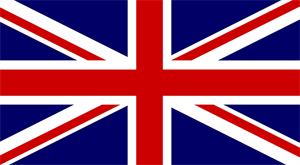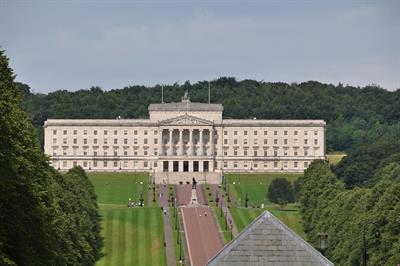OTRĀ SEMESTRA NOSLĒGUMA TESTI
Read, listen and learn or repeat some words and expressions about Northern Ireland.
(Lasi, klausies un iemācies vai atkārto dažus vārdus par Ziemeļīriju!)

Yellow colour on the map.
- Northern Ireland
Northern Ireland is a region which is part of the United Kingdom. Located in the northeast of the island of Ireland, Northern Ireland shares a border to the south and west with the Republic of Ireland.
Northern Ireland was created in 1921, when Ireland was partitioned between Northern Ireland and Southern Ireland by the Government of Ireland Act 1920. Unlike Southern Ireland, which would become the Irish Free State in 1922, the majority of Northern Ireland's population were unionists, who wanted to remain within the United Kingdom.
Northern Ireland — [ˌnɔː.ðən ˈaɪə.lənd] — Ziemeļīrija
- The flags of Northern Ireland

The only official flag in Northern Ireland is the Union Flag of the United Kingdom.

The Ulster Banner was used by the Northern Ireland government from 1953 until the government and parliament were abolished in 1973. Since then, it has had no official status. However, it is still used as the flag of Northern Ireland by loyalists and unionists, and to represent Northern Ireland internationally in some sporting competitions.

The Saint Patrick's Cross or Saltire represents Northern Ireland indirectly as Ireland in the Union Flag. It is sometimes flown during Saint Patrick's Day parades in Northern Ireland, and is used to represent Northern Ireland during some royal events.
Saint Patrick's Cross — [seɪntˈpætrɪks.krɒs] — Svētā Patrika krusts
- Belfast
Belfast (from Irish: Béal Feirste, meaning "mouth of the sand-bank ford") is the capital and largest city of Northern Ireland, standing on the banks of the River Lagan on the east coast of Northern Ireland. It is the 12th-largest city in the United Kingdom and the second-largest on the island of Ireland.
By the early 19th century, Belfast became a major port. It played a key role in the Industrial Revolution, becoming the biggest linen-producer in the world, earning it the nickname "Linenopolis". By the time it was granted city status in 1888, it was a major centre of Irish linen production, tobacco-processing and rope-making. Shipbuilding was also a key industry, the Harland and Wolff shipyard, which built the Titanic, was the world's biggest shipyard.

Belfast — [ˈbɛlfɑːst] — Belfāsta
- Nationality
Northern Irish people is a demonym for all people born in Northern Ireland, or an ethnic group of people who were born in or grew up in Northern Ireland, or people who are entitled to reside in Northern Ireland without any restriction on their period of residence. Most Northern Irish people either identify as Northern Irish, Irish, British, or some combination thereof.
Northern Irishman — [ˌnɔː.ðən ˈaɪə.rɪʃ.mən] — Ziemeļīrijas iedzīvotājs
Northern Irishwoman — [ˌnɔː.ðən ˈaɪə.rɪʃˌwʊm.ən] — Ziemeļīrijas iedzīvotāja
the Northern Irish — [ˌnɔː.ðən ˈaɪə.rɪʃ] — Ziemeļīrijas iedzīvotāji
- Language
English is spoken as a first language by almost all of the Northern Ireland population. It is the de facto official language.
Under the Good Friday Agreement, Irish and Ulster Scots, are recognised as "part of the cultural wealth of Northern Ireland".
Irish — [ˈaɪə.rɪʃ] — īru valoda
Ulster Scots — [ˈʌl.stərˌskɒts] — Ulstera (Ziemeļīrijas) skotu valoda